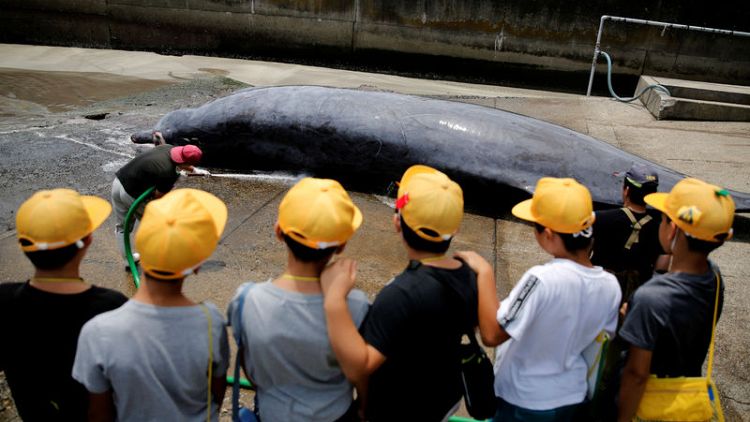By Elaine Lies
MINAMIBOSO, Japan (Reuters) - As Misako Komiya watched a crew of men in rubber boots peeling skin and blubber off a whale with long knives, she was already planning how to prepare the five kilos (10 lbs) of meat she intended to buy.
"I'll chop it really fine, simmer it with sugar, ginger, soy sauce and sake, then freeze it. It'll last a year, I can take it out and eat it bit by bit with rice," the pink-aproned 86-year-old said on Thursday as the Baird's beaked whale was cut apart in a cement shed and waves crashed on a nearby Pacific beach.
"Everybody's happy today," she added.
Komiya was part of an avidly watching crowd that included 45 children brought by their teachers to observe the butchering, a decades-old tradition for primary school pupils in the city of Minamiboso, which lies just east of Tokyo and has whaled for generations.
Japan maintains that most whale species are not endangered and that eating them is a cherished culinary tradition. Tokyo dropped out of the International Whaling Commission (IWC) on June 30 and resumed commercial whaling on July 1 this year.
The first minke whale taken in that hunt, off Japan's northernmost main island of Hokkaido, was killed by a ship based in Minamiboso.
"I'll admit, it was nice that our boat was the one to kill the first whale in the first hunt after the resumption," said Yoshinori Shoji, the president of Gaibo Hogei Corporation, who oversaw Thursday's butchering of the 9.7 metre whale, the first taken off Minamiboso this summer.
After listening to an explanation by Shoji and watching the whale being winched up from the ocean, the children - clutching pencils and notebooks - were invited to touch the whale's rubbery gray skin. Nearly all did, some exclaiming "Wow!" as a teacher told them to write down what they felt.
Following a ritual toast of sake, which was also used to wash down the adzes and hooks used by the workers, the crew began slicing into the whale's back and stomach, peeling aside skin and attaching hooks used to pull off the blubber and then the meat inside with a crunchy ripping sound.
"Whoa, look at that red meat," one boy said as other children oohed. A few made sounds of disgust or pulled shirts up to cover their noses as blood ran down gutters to the sea.
Bringing the children down to see the first whale is part of the school's efforts to teach them about local traditions, said principal Noriko Morita.
"Eating whale is part of our food culture, and we want to teach the children to have pride in their hometown and its traditions," she added.
"They're ten, they're just the right age to take lots of things in."
About half the children retreated to a nearby wall part way through the proceedings, mainly for relief from the stifling heat. The rest remained rapt, pointing at the whale as it was sliced apart.
"It was bigger than I expected," said Yuka Ishizuka, who said she liked to eat whale. "I realized that when we eat it, we are receiving its life force."
But classmate Yumehito Sakuma disagreed. "It's a little bit disgusting," he said.
Within 90 minutes, nothing was left of the whale but its bones as workers sorted meat into ice-filled bins and neighbourhood residents lined up picnic coolers in anticipation of sales later that afternoon.
Shinichi Nojiri, a 59-year-old worker at a shipbuilding company who used a vacation day to come watch, said he thought the process was a bit grotesque and he personally couldn't remember having eaten whale, although many older Japanese had it in school lunches.
"I don't think we need to take as much as we used to in the old days," he added. "There aren't as many people that eat it. Yes, it's part of our food culture, but I don't think it's absolutely essential anymore."
(Editing by Nick Macfie)
